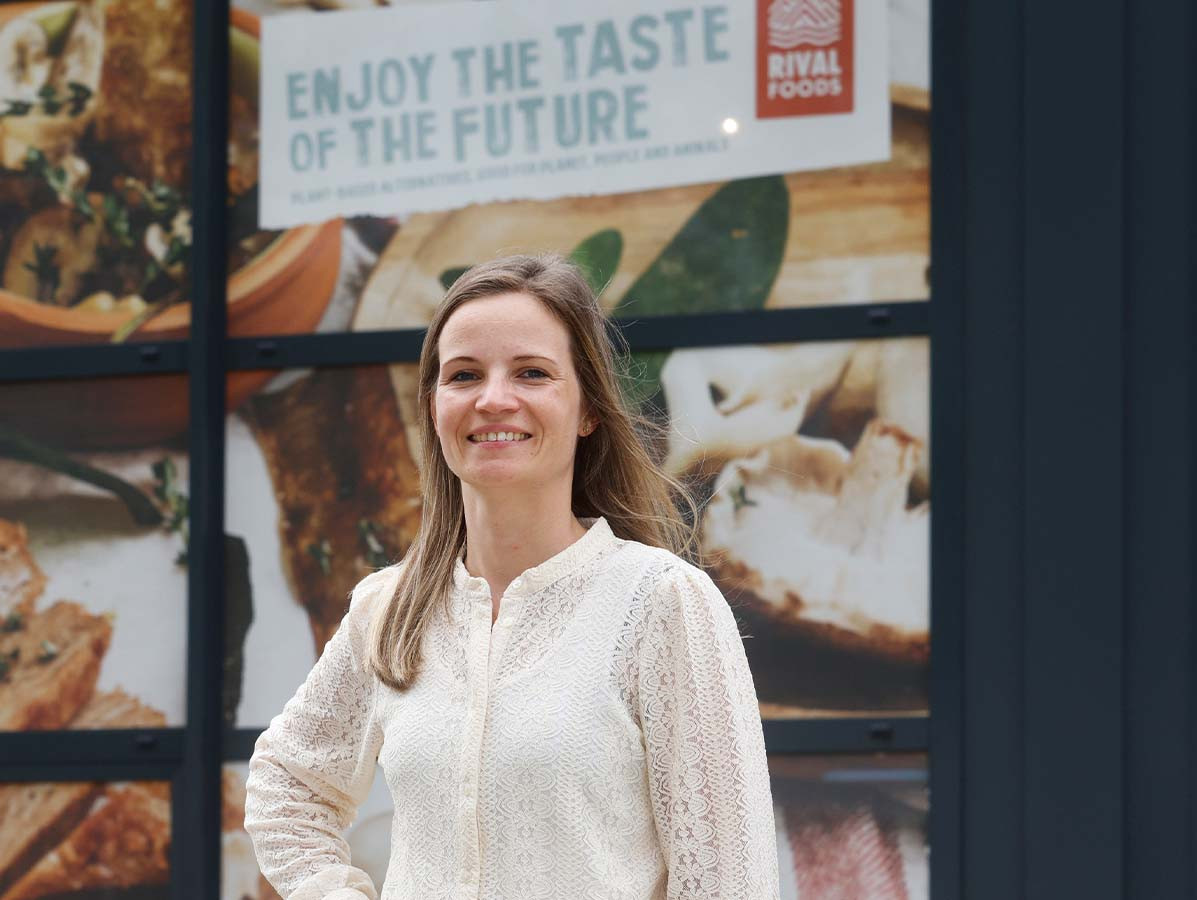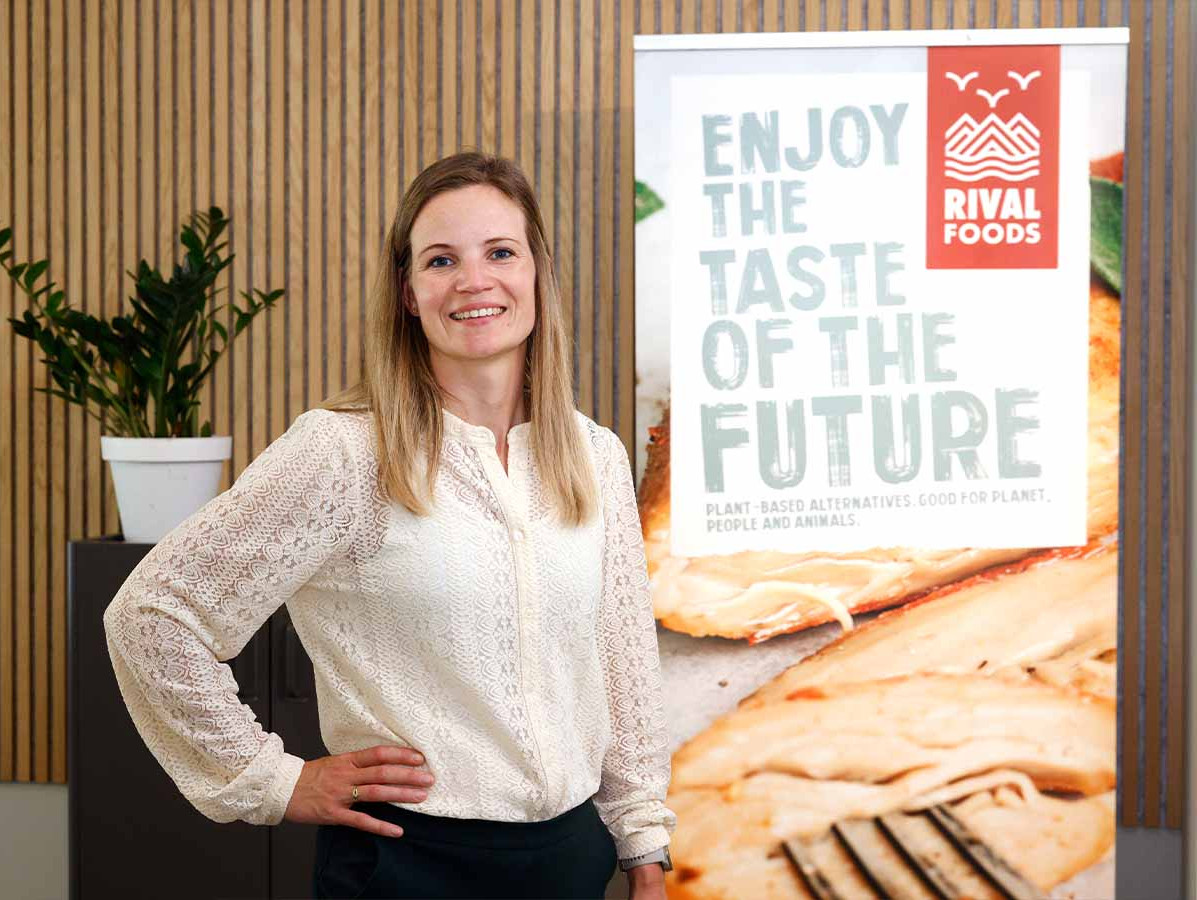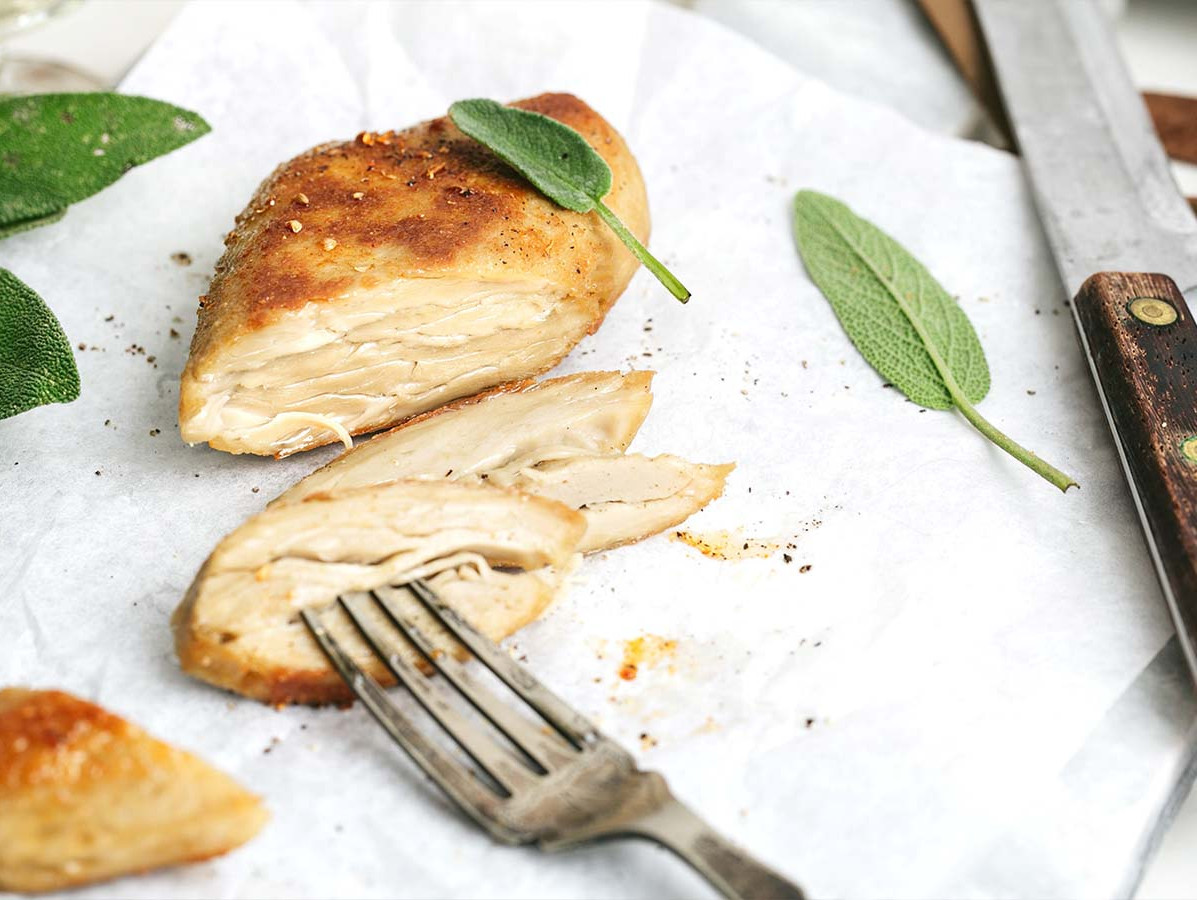
Shear cell technology is a new method for adding texture to plant-based proteins. The start-up Rival Foods has successfully scaled this technique from lab level to industrial production. This summer, the company opened a production facility in Geldrop. Founder Birgit Dekkers shares the remarkable journey from lab to production.
"Consumer research shows that many people are open to eating less meat but struggle to integrate it into their meals. Eating meat is a tradition, a habit that’s not easy to break," says Birgit Dekkers, founder of Rival Foods. She continues, "People rarely choose meat because they want to eat an animal—they’re attached to the experience and taste. Many plant-based alternatives today come in the form of burgers, minced meat, or sausages. However, unprocessed whole cuts, like chicken breast, ribs, or fish fillets, are still hard to find. We create products that closely replicate the taste, texture, juiciness, and cooking experience of meat."
"When producing meat substitutes, many techniques break down the raw material and then reassemble it using plant-based proteins. Shear cell technology takes a completely different approach. We heat plant proteins—mainly from soy and gluten—in a device to just above boiling point. While under light pressure, similar to a pressure cooker, we apply specific forces to align the proteins in a way that forms fibrous structures. These structures are the foundation for a new generation of meat substitutes that mimic the taste and texture of real meat. The variations we bring to the market are created through different formulations and process conditions, such as temperature, time, and shear force."
"Since 2010, this technology has been used for plant-based meat substitutes. Before that, Prof. Dr. Atze Jan van der Goot from the Food Process Engineering group at Wageningen University & Research (WUR) experimented with it for other applications," Dekkers explains. "I started my PhD under him in 2014, but I knew early on that academia wasn’t for me—I wanted to move into the business world and work on innovative products."
"We began in the lab with a small device that could produce 100 grams per hour. We scaled that up to seven kilos per batch, which took us about three hours. I truly believed in the technology and saw the future potential of the products we could make. But the gap between scientific research and commercial application was too large. Companies demand around 1,000 kilos per hour. The technological development to make this commercially viable wasn’t happening. There was a wait-and-see attitude."

Birgit Dekkers
"After my PhD, I applied for a grant for a feasibility study. At the time, between 2017 and 2019, there was significant growth predicted for meat substitutes, and our technology was unique. The USP was clear. I wanted to start my own company, but not alone. Through the directory of The Good Food Institute, I connected with Ernst Breel. He had a technical background, startup experience, and was ready for a new challenge. Four months later, in 2019, Rival Foods was founded. We took the plunge together, built up the company, and now he’s moving on to new things. I’m fairly optimistic—maybe a bit naive. I had just completed a great research project, saw plenty of market opportunities, and thought: I’ll just go for it, what do I have to lose? In my mind, the biggest loss would have been doing nothing."
"The first challenge was making proper agreements with the university. There’s no guidebook on the rights and obligations of a spin-off from scientific research, so we had to figure that out. In the end, Wageningen University became one of the shareholders. On January 1, 2020, we were finally able to officially start."
"Just before that, we had rented space in the old barracks in Ede, now the Foodexpo in Ede. That was our good fortune. When the university shut down, we were able to continue working in our own office on our own schedule. The time when much around us stopped gave us the opportunity to focus on developing the machines and products. We applied for patents and built a pilot setup in a food-safe environment. We managed to produce about 15 kilos per hour, which allowed us to create samples and approach potential clients. Fortunately, our product doesn’t fall under the novel foods category, so we avoided that lengthy approval process."
"On March 1 this year, we received the keys to our production facility in Geldrop, and by July 1, we had started production. We can produce up to 400 tons annually here, but that’s still not enough to meet our ambitions. Our goal is 1,000 kilos per hour, which aligns with existing packaging and freezing lines."

Birgit smiles. "Oh, so many things! But I’m especially proud that our products are now being served not only in some restaurants and childcare centers, but also in hospitals. The feedback has been great. Health is a top priority in hospitals, but sustainability is increasingly important too. Companies, including hospitals, have sustainability targets, especially now with the Corporate Sustainability Reporting Directive (CRSD). This pushes them to look for more sustainable products. Our product is healthy: high in protein, low in saturated fat and salt, and a tasty, nutritious alternative to meat. I love that we can contribute to that."
"Of course, I’m also really proud of our team, which is fully committed to our mission of bringing delicious plant-based products to market that make a meaningful contribution to the protein transition and reducing meat consumption. We’re not anti-meat, but meat is currently too cheap. It should become more of a specialty again—something for special occasions, maybe once or twice a week."
"For us, quality is key, which is an important aspect of sustainability. If it doesn’t taste good, people won’t eat it, and then all the energy invested in making it is wasted. WUR has conducted extensive research on other sustainability aspects, and shear cell technology has performed well. The process has a lower environmental impact compared to animal meat production. In terms of process steps, we use less energy than extrusion, the standard technique for making meat substitutes. If a process is less resource-intensive, the ingredients often become cheaper, which is a great incentive."
"Within our company, we aim to produce as efficiently as possible, using minimal energy and managing water consumption more intelligently. However, the biggest impact comes from ingredient choices. The more refined the ingredient, the more energy it takes to produce. Do you choose whole soybeans, a concentrate, or an isolate? With every step, you lose some nutritional value and use more energy."
"In addition to contributing to sustainable and healthy food, our core mission is to accelerate the protein transition and revolutionize the food industry by introducing plant-based products suitable for all types of cuisines and diets. That’s why we aim to collaborate with various commercial partners to make our products internationally accessible to a wide range of consumers. Having our product available in hospitals is fantastic. It shows there’s not just a push from our side, but a growing pull from consumers as well."
Photos: © Ton Kastermans Fotografie
Source: Vakblad Voedingsindustrie 2024